- Home
- Neal Shusterman
Violent Ends Page 25
Violent Ends Read online
Page 25
“I’m way too pale,” she said. “If people can’t tell the second they look at me that I’m gonna get skin cancer, what’s the point of living?”
“I ask myself that every day,” I said. I was wearing a big floppy hat because even fake redheads can burn like crazy, it turns out.
She nodded toward the end of the parking lot. “They’ve still got those security guards,” she says.
“Yeah.”
“Like, what, do they think what’shisname’s gonna waltz into campus and start blowing people up? Pretty sure that’s against the laws of physics.”
“Biology.”
“Whatever.”
“They want me to write about him,” I said.
“Who does, the Gazettacult?”
“Yeah.”
“Why?”
I broke a carrot stick in half and shoved a piece of it in her mouth so she wouldn’t be able to speak right away. “I lived next door to him when we were kids.”
She chewed slowly and swallowed. “Wild.”
“I guess.”
“Did you, like, know him?”
I shrugged.
“But you didn’t, like, know he was going to do this.”
“Are you joking? I haven’t talked to him in, what, five years? We weren’t exactly Facebook friends.”
“Why not? I’m Facebook friends with this bitch who used to pull my hair in kindergarten.”
“Why?”
“I dunno. I’m Facebook friends with everyone.”
“But not Kirby Matheson.”
She laughed a little. “No, I was not Facebook friends with Kirby Matheson.”
“You still probably know as much about him as I do,” I said.
I watched some seniors come out of the front door, shoving each other around. They say they’re going to put metal detectors up by the front doors, but I still don’t know if that’s just a rumor.
“So what do they want you to write?” she said. “Something about what a sweet kid he was, how could he have done something like this?”
“They said I could do an interview if it’s too emotionally difficult for me to write about it myself.”
“Woe is Laura.”
“They want me to humanize him,” I said. “Talk about how he was as much a victim as everyone else.”
“A victim of what?”
“I don’t know. The system.”
“Well, he was, like, mentally ill, right?” she said.
“You gotta assume, but, like, I’m on antidepressants and I’m not going to mow down a school, and it’s thanks to people like him that everyone thinks I might.”
She lay on the windshield and stretched her arm behind her head, shirt riding up to reveal the two piercings on the top and bottom of her belly button. “I guess it’s important to talk about this shit from both sides. Feeling sorry for the victims, feeling sorry for him.”
“Yeah. Sympathizing with him.”
“He was a person.”
“Why do people keep saying that like it means something?”
“Who said that?”
“Nicole. You.”
“Wow, that’s, like, a whole army.”
“That’s not even why they want me to write about him,” I said. “They don’t want me to write about him because they actually feel some kind of empathy for the guy. They want me to do it because they think it’s such an edgy thing for the school to write about, that everyone will think we’re so ahead of the times to be able to write about this guy as a fully developed whatever so soon after it happened. We’ll have that kind of impartiality my sister’s college counselor’s always telling her she needs to try for her essays. You know what she tells her? That if they want an essay about who was the best president and why, you don’t write about Roosevelt or JFK or Lincoln or Jefferson, because everyone’s going to do those. You have to pick William Henry Harrison. You pick Chester K. Arthur. You pick Nixon. It doesn’t matter who you have to defend as long as it isn’t boring.”
“So the newspaper doesn’t want you to be boring. It’ll be a nice change from bake sale announcements.”
“But . . . once you decide you’re going to find every little bit of anything good in absolutely everyone, or once you decide that it’s important to recognize every single bit of good in absolutely everyone . . . I mean, don’t you think that’s potentially extremely fucked up? You’re going to turn into one of those people who buys Hitler’s paintings because you think they’re proving some kind of point, when really the pictures aren’t all that good and, oh right, he was Hitler. But good for you for being able to see past genocide! Look how enlightened you are!”
Priya said, “All right, Tiger, calm down. Matheson wasn’t Hitler.”
“Okay, so I’ll give some interview about how he wasn’t Hitler.”
“I’m pretty sure it was Chester A. Arthur.”
“That’s what I said.”
“Liar.”
“Shut up.”
“Just talk about something nice that happened when you were kids,” she said. “You don’t have to go and spell out, like, look at this poor troubled lad who deserves our forgiveness. Just talk about a time you hammered croquet brackets into the ground to pretend you were doing slave labor.”
“What?”
“That’s what I did with my next-door neighbor. But she died.”
My throat felt tight all of a sudden. “In the shooting?”
She looked at me, sunglasses slipping down her nose. “What? No, she just, like . . . died. Last year or two years ago or something. I only know from Facebook. Her profile’s still up with this extremely unfortunate photo. I want to send her family some anonymous offer to Photoshop the zits out.”
“Okay, see, she’s dead and you’re not talking about her like she’s some angel.”
“Well, I’m a cold, heartless bitch—we know this.” She pushed her sunglasses back up. “You’re not.”
“He wasn’t my friend,” I said.
She singsongs, “I don’t believe youuu. Give me the rest of your pizza.”
“No. I hate everything.”
“I know, dear.”
“What am I supposed to do?”
“Just tell a story,” she said. “You’re good at telling stories.”
* * *
The newspaper office was bustling, mostly because we had a dance the next week and there were a lot of advertisements from our sponsors that needed to be arranged and printed perfectly. That was what everyone cared about at this point. This girl in the corner was sniffling into a tissue, but I think I remembered her having allergies.
Leo opened up a new document on his computer. “Okay, I’m just gonna take some notes, is that cool?”
“Yeah.”
“You sure you don’t want to write this yourself?”
“Uh-huh.”
“Okay. Whenever you’re ready.”
I started with the facts, like a good reporter. “I lived next door to Kirby Matheson on Egret Lane from the time I was, I think, six to when I was nine. We were the only kids on the block, other than his sister, so I knew him pretty well. His mom and my mom were sort of friends. Like if they were both in the yard they’d stop and talk for a while, but it’s not like they were going out to lunch with each other all the time.”
Leo nodded, typing.
“We went to each other’s birthday parties for at least a few years in a row. We used to play out in my backyard and he’d come in, you know, for apple slices or whatever when I was going in.”
“What was he like?” Leo said.
And it was time to start storytelling.
“Nice enough,” I said. “He was, you know, quiet. All that stereotypical stuff people always say. He seemed so normal, never would have thought, et cetera.”
“Did your parents like him?” he said.
“Parent. Just my mom.”
“Right, sorry.”
I didn’t know why he was apologizing. There was no reason he sho
uld have known. “And yeah, sure, I guess.”
“Did you ever think he’d do something like this?”
“What, you mean when I was eight?”
“Or since then, if you ever thought back to him.”
“I didn’t think back to him.”
“Never?”
“Do you think about kids you knew when you were little?”
“My friends? Yeah, sometimes.”
“Well . . . I didn’t.”
“Okay,” he said. “So when you were a kid, then. You never thought he’d do something like this.”
I said, “I still can’t imagine anyone doing something like this.”
“I don’t know if we can use that,” Leo said.
“Why?”
“I don’t know . . .” He typed for a while. “It’s just kind of obvious, I guess. That’s what everyone says, you know. Unfathomable tragedy.”
“Maybe that’s because it’s unfathomable.”
“We’re journalists,” he said. “We have to dissect this stuff, it’s our job. We can’t just say something’s too horrific to talk about. How about that rugby team that ate each other in the Andes? There are, like, four movies about those guys.”
“So we’re trying to make a movie, then?”
“Don’t mince words, Laura.”
I couldn’t believe I used to have a crush on this guy.
“Okay,” he said. “Why don’t you tell me a story about him? It would make a good opener.”
“Okay.”
“Yeah, you got one?”
“Yeah.”
He smiled a little at his screen. “Awesome.”
“Okay, so one time . . . I was about six, maybe, and he was eight. I was in my yard catching all these fireflies in a jar; it was probably August. One of those sticky nights. Mosquitos. So I’m running around kind of scooping up as many as I can and trapping them in there, and then he comes out.”
“Kirby.”
“Yeah. And he says, ‘Hey, gimme that.’ So I give him my jar.”
“Because he was your friend.”
“What?”
“I’m just clarifying, you know, he asked you for something and you willingly gave it to him.”
“Does that matter?”
“It’s about filling in the holes, that’s all. Making him make sense.”
“So he took the jar,” I said.
“You said you gave it to him.”
“Okay, fine, I gave it to him. And he takes it and he pokes holes in the top of the lid so the fireflies don’t die. I’d totally forgotten to do it.”
“What did he poke the holes with?”
“What?”
“For the holes in the jar. What did he use? I’m guessing he didn’t just have a pocketknife on him.”
“So he ran inside and got a knife, I guess.”
“That’s interesting,” Leo said. “You know, him having a weapon already.”
“That’s not . . . Maybe it was scissors.”
“Scissors can be a weapon.”
“This is so fucking stupid,” I said plainly.
“No,” he said. “This is actually really good. We can do a whole thing, like, juxtaposing how he felt about life. Saving a bunch of fireflies and . . . you know.”
“And murdering a bunch of people,” I said.
“Yeah.”
“You’re a journalist,” I said. “You’re not supposed to talk around stuff.”
“Yeah, yeah.”
“Don’t mince words, Leo.”
He hit ctrl-S on his keyboard. “Anything else?”
“I don’t think so.”
“Okay. Thanks, Laura. This will run in two weeks, probably. We don’t want to put it in the dance issue. Seems kind of tacky. Thanks for doing this. It was really brave.”
“Yeah.”
* * *
Here we go. One night only.
You want to hear a story?
I was about six. I was in my yard catching fireflies, scooping them up into a jar. It was August, probably. One of those sticky nights. Mosquitos.
And the boy next door, the one who laughed that time I skinned my knee, the one who bit me, the one who used to ask me whenever I was crying if it was because I wanted my dead father—
He came outside and grabbed for my jar and said, “Hey, gimme that.”
And he took it from me.
And he shook it until they were all dead.
I’d forgotten to put holes in it.
They couldn’t get out.
HISTORY LESSONS
“Is that Matheson?” I ask. “What the fuck is he doing?”
Jackson half turns, following my gaze. He frowns.
“What’s he got in his—”
When the bullet tears into Jackson, his brain misfires, sending frantic, confused messages through his body. It gets everything all tangled up. He doesn’t know what’s happening. He’s dying faster than he can process it, dying faster than he can take in Kirby Matheson and the gun and where all the blood is coming from and why can’t he get up because he wants to get up. It’s not happening, man, sorry, I think, but what’s coming out of my mouth is something else entirely, all of it animal, none of it words. Jackson’s in my lap and he’s heavy, heavier the more of himself he loses, his teeth stained red, his arms flapping uselessly against the ground like a bird with wings too broken to fly. Matheson looms over Jackson and me, his gun half poised, and I remember the three of us when we were young and how Kirby was, and how I knew then—I knew—and how sorry they made me for it and how sorry they’ll all be now. I want to tell them both but by the time I find the words, Jackson’s dead and gunfire is echoing in the distance.
* * *
“Mrs. Parker is drinking again. I could smell it on her.”
“You’re lying,” Katy says from the front steps.
I dribble the basketball against the driveway.
“Why the hell would I lie about something like that?”
I’m not lying. Jackson’s mom is drinking again. Bet she started up as soon as she got the call. I always thought Mrs. Parker was looking for a reason to get back in the habit and what better one than your son’s death, right?
Not like you can tell a childless parent they haven’t earned a shot or seven.
“Remember when he told us she was getting help? Knew it wouldn’t last.” I toss the basketball, the arms of my black suit jacket straining against the reach. Suit doesn’t fit. Last time I wore it was at my cousin Lissa’s wedding a year ago, but hell if I was going to buy a new one for a funeral. “Just thought he’d be alive to see it.”
The ball bounces off the rim of the basket attached to the garage. It rolls down the driveway and out onto the street. I expect Katy to chase after it for me like she always does, but she just sits there on the front steps of my house, picking at her shoes. Her eyes are red and watery and the skin of her nose is peeling from the constant leaking and blowing ever since Matheson shot up the school. But I guess sex appeal must transcend tragedy because every part of her that’s right is louder than everything that’s wrong. Blond hair, bright blue eyes, perkiest tits in town, and hey, all must not be lost if I can still appreciate the beauty that’s in the world. My parents aren’t home—they’ll be consoling the Parkers for a while—so I decide I’m going to fuck Katy today, because if anything’d raise Jackson from the dead, it’d be that. He loved her, poor bastard, and the closest he ever got to nailing her was hearing about it from me.
“You know, you try to picture Matheson now and he’ll only ever have a gun in his hands, but the thing is, he only ever had a gun in his hands. Just weren’t looking closely enough.” I scratch the back of my neck. Jacket’s too small and the dress shirt I’m wearing is itchy, or maybe it’s the T-shirt underneath. “Most of us, anyway.”
I wait for it, wait for Katy to tell me how I was looking, how I knew, because it’s the least I deserve to hear from someone else, but when I glance at her, she’s not listening to me.
I know she’s not because she gets this little wrinkle right in the middle of her forehead when that happens.
“It’s gonna be weird when we go back,” I say, trying to bring her round to me again. “No Billie Palermo hanging around, staring at your rack.”
That gets through. She winces.
“Shut up, Nate,” she says, and then she surprises me: “And don’t talk about her like that.”
I raise my hands in mock-surrender because I don’t know what else to do.
“Get me the ball.”
She finally looks up to squint at it. The basketball ended up in a puddle across the street and drifts there stupidly like it doesn’t know it’s not meant for water. Jackson gave it to me for my birthday last year. I already had—well, a few. But to be honest, there’s not much I don’t have, so the thought’s gotta count. I made sure every game of Twenty-one he lost to me—Katy cheering us on like we were saving the world—he lost playing with that ball.
“Get it yourself,” she says.
I don’t. I sit beside her, feeling the heat coming off her through the black dress she’s wearing. It’s a little small for her, so tight it rounds out her hips and hugs her ass. Who wears something like that to a funeral? Not that anyone really noticed. Jackson’s funeral was the kind of thing he hates—hated: a production. The Parkers had to keep pushing it back to accommodate the number of rubberneckers who wanted to see the show. News crews, even. He’s probably on television right now, his face a backdrop for a voice-over about a community in shock in a world that isn’t.
I nudge Katy.
“Come on,” I say, like it’s as good as a heartrending speech about all the bullshit we’ve found ourselves living through. It’s not, but it’s the best I can do. Jackson was the one who was good with words and I’m better at stuff like this, I guess. I put my hands against her cheeks until she looks at me. I feel the makeup she’s wearing, heavy and cakey, covering flaws she’s sworn to never let me see, which makes me wonder why I like her if what I’m looking at isn’t real. Then again, I don’t really want to see what’s underneath if she thinks it’s that bad. Her lip trembles, all dry and flakey too.

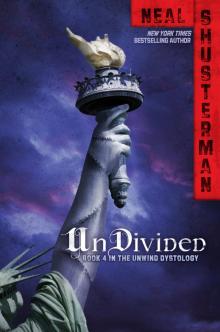 UnDivided
UnDivided UnBound
UnBound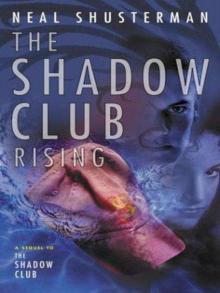 The Shadow Club Rising
The Shadow Club Rising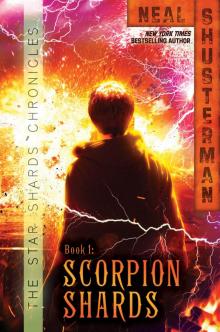 Scorpion Shards
Scorpion Shards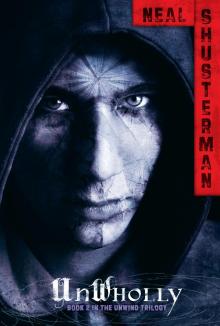 UnWholly
UnWholly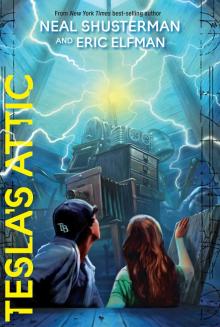 Tesla's Attic
Tesla's Attic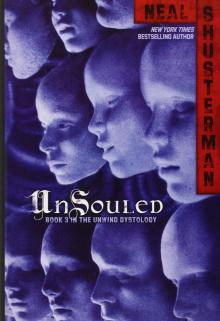 UnSouled
UnSouled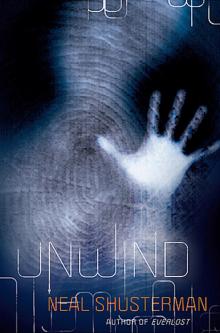 Unwind
Unwind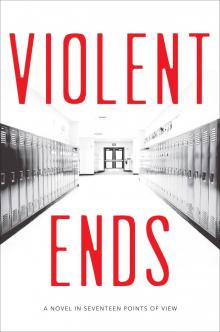 Violent Ends
Violent Ends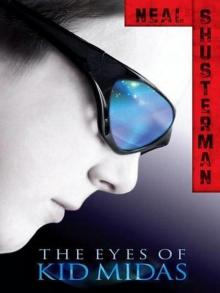 The Eyes of Kid Midas
The Eyes of Kid Midas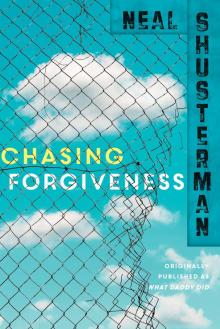 Chasing Forgiveness
Chasing Forgiveness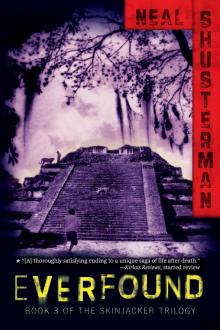 Everfound
Everfound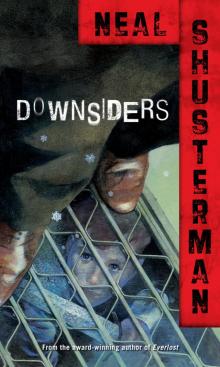 Downsiders
Downsiders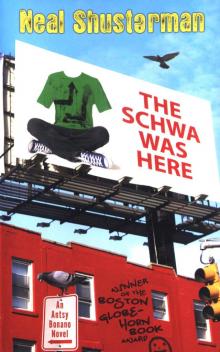 The Schwa Was Here
The Schwa Was Here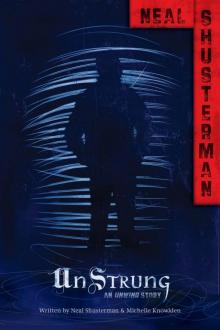 UnStrung
UnStrung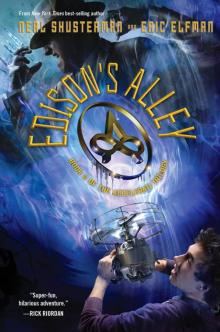 Edison's Alley
Edison's Alley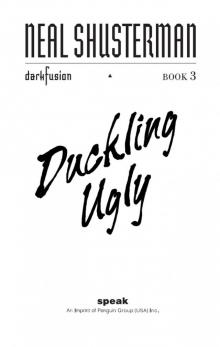 Duckling Ugly
Duckling Ugly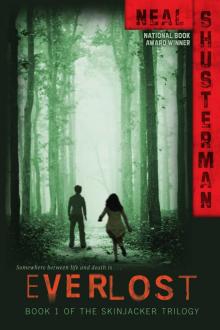 Everlost
Everlost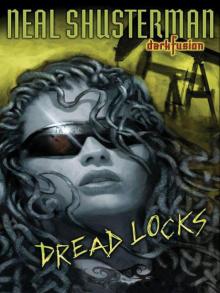 Dread Locks
Dread Locks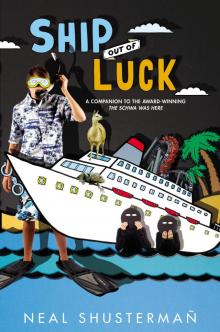 Antsy Floats
Antsy Floats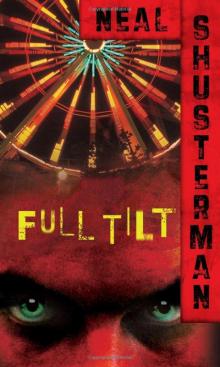 Full Tilt
Full Tilt Thunderhead
Thunderhead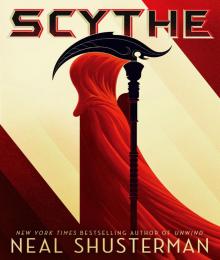 Scythe
Scythe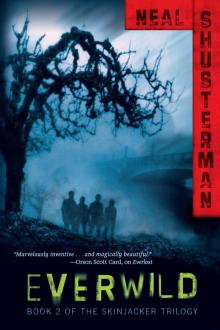 Everwild
Everwild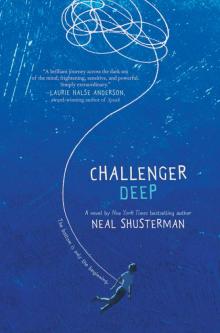 Challenger Deep
Challenger Deep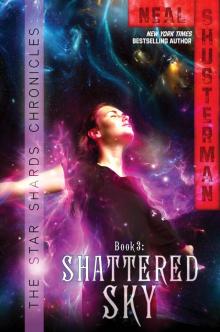 Shattered Sky
Shattered Sky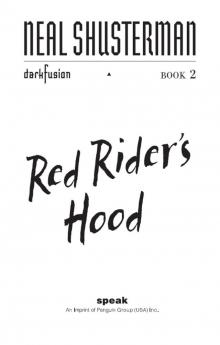 Red Rider's Hood
Red Rider's Hood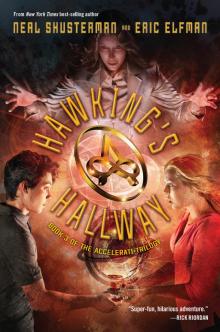 Hawking's Hallway
Hawking's Hallway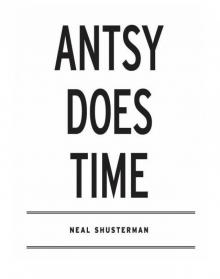 Antsy Does Time
Antsy Does Time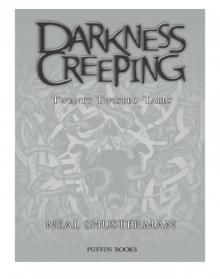 Darkness Creeping: Twenty Twisted Tales
Darkness Creeping: Twenty Twisted Tales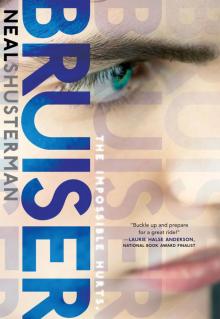 Bruiser
Bruiser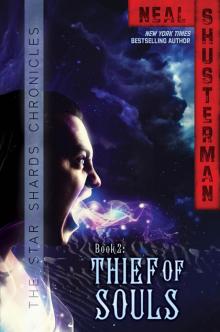 Thief of Souls
Thief of Souls The Toll
The Toll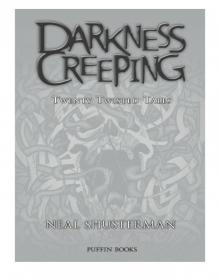 Darkness Creeping
Darkness Creeping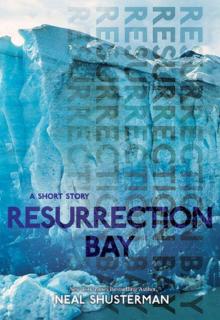 Resurrection Bay
Resurrection Bay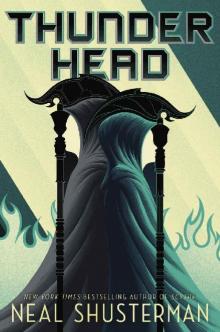 Thunderhead (Arc of a Scythe Book 2)
Thunderhead (Arc of a Scythe Book 2)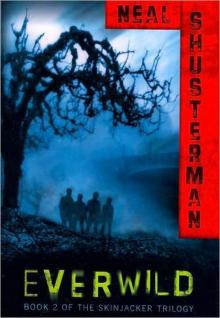 Everwild (The Skinjacker Trilogy)
Everwild (The Skinjacker Trilogy)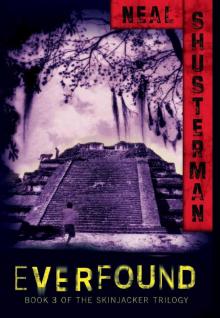 Everfound s-3
Everfound s-3 Edison’s Alley
Edison’s Alley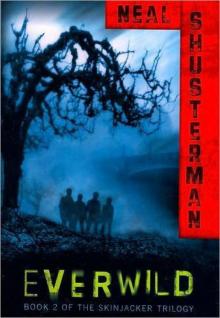 Everwild s-2
Everwild s-2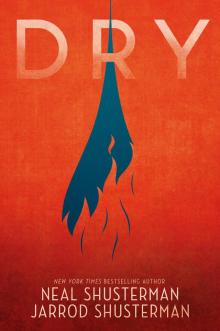 Dry
Dry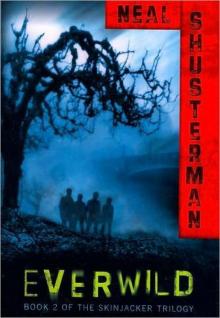 Skinjacker 02 Everwild
Skinjacker 02 Everwild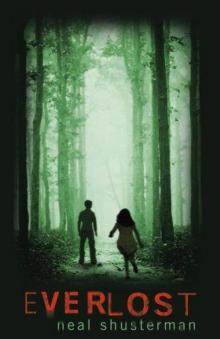 Everlost s-1
Everlost s-1